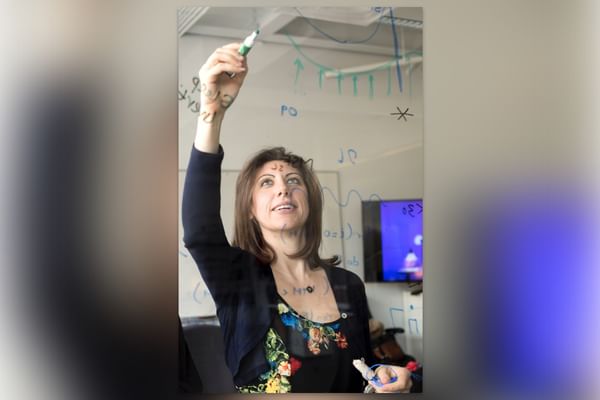- Undergraduate
Bachelor's Degrees
Bachelor of ArtsBachelor of EngineeringDual-Degree ProgramUndergraduate AdmissionsUndergraduate Experience
- Graduate
Graduate Experience
- Research
- Entrepreneurship
- Community
- About
-
Search

Elizabeth L. Murnane
Charles H. Gaut & Charles A. Norberg Assistant Professor of Engineering

Overview
Professor Murnane specializes in human factors, information science, and human-computer interaction, with a focus on applications in public health, STEM education, and environmental sustainability. The bulk of her research is in the domain of digital health, with an emphasis on developing personal informatics tools that promote patient experience and health equity. At Dartmouth, she founded and directs the Empower Lab, a team of students and research scientists working together to create behavioral intervention technologies that aim to positively shape knowledge, attitudes, and actions through a user-empowerment approach. The lab explores the design of various form factors, information formats, and interaction paradigms (e.g., games, toys, tangibles, musical interfaces, narratives, AR/VR/XR, psychotherapeutic visualization, socially assistive robots, and more) that are sensitive to the needs of traditionally underserved populations.
Before joining the Dartmouth faculty, Elizabeth was a postdoctoral scholar in computer science at Stanford University and received her PhD in information science from Cornell University. After completing her undergraduate degree at MIT, Elizabeth also spent 4 years as the lead engineer and head of experimental features of a CSAIL startup that built interactive visualization tools to help software developers make sense of complex codebases. Elizabeth's work continues to emphasize translational approaches that seek opportunities to meaningfully engage with and positively shape industry practices, local communities, and policy-making. Additional research materials, details about current projects, and ways to get involved are available from her website.
Research Interests
Human-centered design, human-computer interaction, ubiquitous computing, personal informatics, social computing
Education
- SB, Mathematics with Computer Science, MIT 2007
- PhD, Information Science, Cornell University 2017
- Postdoctoral Scholar, Computer Science, Stanford University 2020
Awards
- Canvy Award, Darmouth Learning Design and Innovation, 2025
Research Projects
-
Interactive technology for health monitoring and behavioral intervention
Interactive technology for health monitoring and behavioral intervention
The Empower Lab creates digital therapeutics and intervention technologies, with an emphasis on inclusive design, patient experience, and health equity.
We seek students to contribute to the design, development, and evaluation of our interactive tools, which aim to positively shape behaviors and health outcomes through an empowerment approach. Our work employs human-centered methods and explores a variety of form factors and interaction paradigms (e.g., AR/VR/XR, games, toys, tangibles, musical interfaces, narratives, psychotherapeutic visualization, socially assistive robots, and more).
We work closely with stakeholder populations on a range of health topics; key areas of focus include mental health, women’s health, physical mobility/pain, aging-in-place, and pediatrics/childhood development. More details about our lab and its active projects, including specific recruiting opportunities, can be found here: empowerlab.dartmouth.edu/projects
Generally speaking, our collaborative research style integrates interdisciplinary skills from both computing and engineering as well as the social sciences and humanities. Students typically focus on contributing to one or two aspects of a project’s research activities, which include iterative design (UX, prototyping), implementation (software programming, physical fabrication), data analysis (quantitative/statistical or qualitative), stakeholder engagement (conducting interviews, observational or ethnographic work), and running studies (user testing, lab experiments, online or survey studies, or field trials).
If interested in getting involved, you can fill out our application form dartgo.org/empowerlab-apply or email the lab director, Prof. Liz Murnane (emurnane@dartmouth.edu) to share your resume, relevant interests and background, and any questions you might have. We look forward to hearing from you!
News










